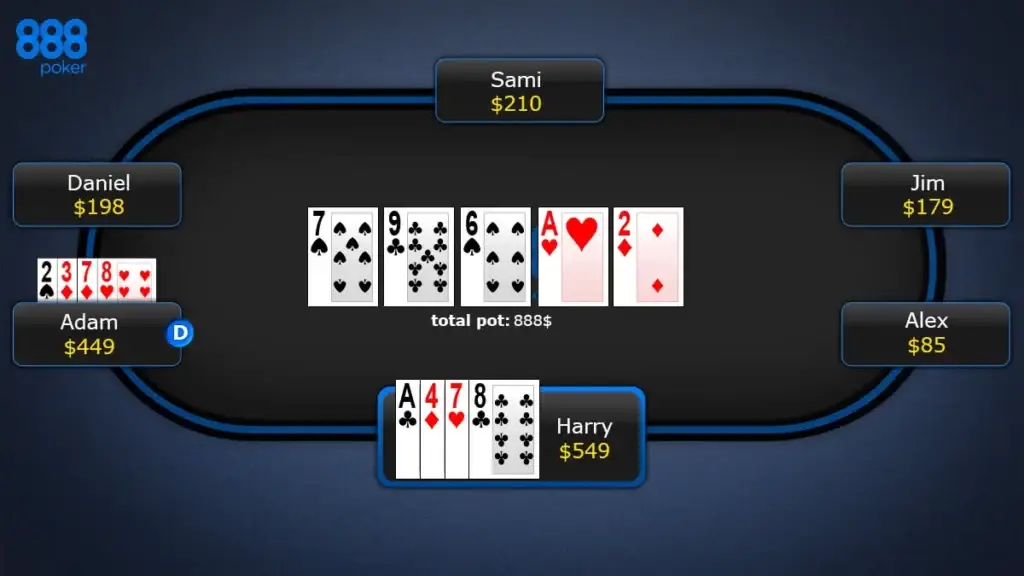There is no such thing as chance in poker when it comes to the real masters. Failures do not stem from a lack of luck, and wins are not a lucky break. Cold calculation rules here. Any winning strategy in poker is a system that the player follows like a ship’s captain follows a compass. If you break the attribute, don’t be surprised when you go down.
Why is strategy more important than luck?
For a long time poker was considered a game for those who believe in a lucky star. But now participants realize that it is not a game for casual upstarts, but a discipline where the one who is better prepared wins. The average player who relies on luck ends up where most lottery ticket buyers do – on the sidelines. Effective poker strategies provide predictability and control, and only those who systematically calculate the risks will succeed over the long haul.
Statistics prove it. It is hard to imagine that a person who has been achieving high results for years does it because of constant luck. In most cases, winnings are calculated and suffered – analytics, discipline and control of each stage. Legendary players like Daniel Negreanu have repeatedly mentioned that intuition is only a tool in the hands of those who have perfectly mastered the strategy.
Basic Poker Strategies for Beginners and Professionals
 Beginners and experienced players use different strategies. Study them to have a full understanding of the methods and find the best option for yourself.
Beginners and experienced players use different strategies. Study them to have a full understanding of the methods and find the best option for yourself.
How to choose starting hands and avoid beginner’s mistakes
Success in poker starts with the right starting hand. It can be compared to choosing a dance partner: if you take a clumsy dancer, the rhythm will be lost already at the first steps. In gambling, the choice of starting hand is the basis for the successful development of the hand. Basic poker strategies include understanding the strength of the combination and the ability to correctly assess the position at the table. For example, a pair of aces – always a power, but do not forget about the possible dangers if there are aggressive opponents.
One of the most important tips for beginners is to avoid “trap” hands, such as jack-ten of different suits. They look playable, but often lead to unnecessary losses. Position at the table is crucial. The closer you are to the dealer, the more information you can gather about the other players, which helps you make more accurate decisions.
Advanced strategies for professionals
For experienced players, the game becomes a complex chess game where it is important to think several moves ahead. Advanced poker strategies include so-called multi-level thinking – when a player calculates not only his own but also his opponents’ actions and their perception of his decisions. All of this builds a network of possible outcomes, and the ability to manage the network is a fundamental element of skill.
So, working with hand ranges is another important technique. Professional level players don’t just guess what cards their opponents might have, they calculate probabilities based on actions.
An example from a real game: if an opponent raises preflop, but then is passive on the flop, it could mean that his range is narrowing to “medium” pairs or bluffing.
Playing out of position: how to minimize the disadvantages and take advantage of the advantages
Postflop strategies without position (OOP)
Swimming against the tide. It’s more complicated, more costly and requires more effort. Playing poker without position postflop is often a challenge even for experienced players. The key to success is understanding when it is better to check-raise and when it is better to continue your aggression with a Continuation Bet. For example, a check-raise in response to an opponent’s continuation bet is an effective poker strategy if you suspect that your opponent is weak and is trying to “squeeze” the rest of the hand.
The secret to success in OOP play is to constantly evaluate the strength of your hand in the context of your opponents’ actions. If a low card comes on the flop and your opponent makes a small bet, this can be a sign of weakness, and in such cases aggressive continuation often works.
Using a bluff without position
Skillful bluffing is one of the poker strategies that can get a player out of even the most difficult situations. It is important to recognize when your opponent is playing cautiously and looking to end the hand with minimal losses. In such cases, using a check-raise or a small bet can bring success even if the player does not have a strong hand.
Bankroll management is the key to long-term profits
It doesn’t matter how good a winning poker strategy is if your bankroll management suffers. Imagine a sports car driver who doesn’t know how to control his speed – sooner or later he’s going to have an accident. In gambling, bankroll management is the foundation of long-term profits and sustained success.
The bets should be in line with the size of the budget, and it is important not to exceed the limits, even if it seems that “now it will be lucky”. The optimal approach is no more than 5% of the total bankroll per game. The method protects against complete loss even in the case of an unsuccessful series of hands.
Poker psychology: control yourself to control the game
Controlling your emotions and “reading” your opponents is something that professional players are not without. If you are a beginner, we advise you to develop emotional stability and observation.
Emotional control and tilt
“Tilt” is a word that makes most players shudder. It is a condition where emotions take over common sense. After an unfortunate “lucky” flop, which brought the opponent a victory, many players lose their temper and start making mistakes.
The secret to successful play is emotional control. The ability to distract yourself, to pause, to count to ten before the next move. Doyle Brunson, one of the greatest players in history, repeatedly said that the ability to stay cool is the main factor of success on the distance.
“Reading” opponents – the art of analyzing behavior
Not magic, but analytics. A good player pays attention to every little detail, from the way he bets to the facial expressions and gestures of his opponents. Poker strategies involve constant analysis, where every look and every pause counts. For example, if an opponent suddenly becomes nervous and changes the pace of betting, it may indicate a weak hand.
Practical tips and techniques to improve your game
Learning poker is a never-ending process, and there is always something to learn. A good place to start for beginners who want to know and understand more strategies is with books like “Super System” by Doyle Brunson or “Poker as a Job” by Barry Greenstein. Online courses and videos can also help improve skills. It’s important not just to watch the lessons, but to take notes, analyze mistakes and try new techniques.
Analyzing games: How to learn from mistakes
One of the most effective ways to improve your poker strategy is to analyze past sessions. Using trackers like PokerTracker can help you identify mistakes and adjust your approach to the game. A player may notice that he is losing too many chips on weak combinations and stop playing them in high-risk situations.
Start applying strategies and succeed at poker
 Gambling is a test of intelligence and stamina. Effective poker strategies can help you take control of the situation and minimize the influence of chance. Start simple – study your opponents, choose the right hands and don’t forget about bankroll management.
Gambling is a test of intelligence and stamina. Effective poker strategies can help you take control of the situation and minimize the influence of chance. Start simple – study your opponents, choose the right hands and don’t forget about bankroll management.



 A type of poker where players are dealt four cards instead of two. They offer many opportunities to create strong combinations, but they also make you take more risks. To win, you have to be prepared to constantly change, because every decision is a step into the unknown. Omaha is especially interesting for those who prefer complex strategies and are willing to take risks.
A type of poker where players are dealt four cards instead of two. They offer many opportunities to create strong combinations, but they also make you take more risks. To win, you have to be prepared to constantly change, because every decision is a step into the unknown. Omaha is especially interesting for those who prefer complex strategies and are willing to take risks. The game is multifaceted, and there is something for everyone. The strategic challenges of Texas Hold’em, the excitement of Omaha, the calm of Stud or even the opposite of Razz – each type of poker offers a unique experience and characteristics. Don’t settle on one format – try them all and find the one that best suits your playing style.
The game is multifaceted, and there is something for everyone. The strategic challenges of Texas Hold’em, the excitement of Omaha, the calm of Stud or even the opposite of Razz – each type of poker offers a unique experience and characteristics. Don’t settle on one format – try them all and find the one that best suits your playing style.





